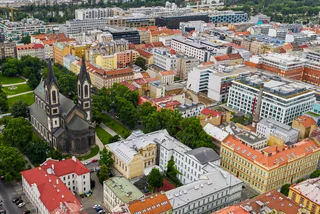House prices in the Czech Republic rose the third fastest year-on-year out of 56 countries worldwide, according to a survey by consultancy Knight Frank.
In the 12 months
from the second quarter of 2018 to Q2 2019, Czech house prices rose
9.4%. China was in first place for the first time at 10.9%, followed
by Malta at 10.8%. Luxembourg, Mexico, Hungary, and Chile all showed
year-on-year increases over 9%. The global average was 3.4%.
Europe took up half
of the top 10 countries in the Global House Price Index Q2 2019.
The index has seen a
slowdown in annual growth for six consecutive quarters. For the Czech
Republic, the growth in the first quarter of 2019 was 3.6%, while in
the second quarter it was 1.7%. Peak average growth worldwide was in
the second quarter of 2017, when it exceeded 6%.
Reasons for the
slowdown in growth include trade wars, Brexit, political protests,
and weakening economic forecasts. These are negatively affecting
buyer sentiment, despite interest rate cuts in the last quarter.
“At 10.9%, China’s
growth represents the index’s lowest ranking top performer since Q1
2009.
China’s leads due
to Slovenia and Latvia, last quarter’s frontrunners, slowing at a
faster rate.
Perhaps
counterintuitively, this quarter also saw the highest percentage of
countries and territories (93%) register either flat or positive
price growth year-on-year since 2009,” the index stated, adding
that more locations are registering price rises year-on-year, but
their average rate of growth is slowing.
Demand was pushed by
expanding economies, rising wages and greater access to credit. “In
Europe, slower growth is a common theme but some interesting trends
stand out; Austria (7.3%) now outperforms Germany (5.0%), Portugal
(7.8%) is rising up the rankings, and Central and Eastern European
countries continue to perform strongly – The Czech Republic (9.4%),
Hungary (9.2%) and Bulgaria (7.3%),” the index stated.
Brexit uncertainty
caused the UK to slip from 36th place a year ago to 48th place. “It
remains a highly localized market, with some cities including
Birmingham, Plymouth and Cardiff outperforming the average and
evidence of pent-up demand building at the prime end of the market,”
the index stated.
Only four markets
registered a decline in annual prices, and two of those were in
Europe: Italy and Finland. Italy was also the only G7 member to see a
drop, while France was the only member not to see a slowdown.
Morocco and
Australia were the others to register a drop, but Australia is
expected to reverse that situation. “With two interest rate cuts
this year, new lending stimulus in place and prices bottoming out, we
expect Australia to rise up the rankings in the second half of 2019,”
the index said.
As a region, Latin America was the strongest world region in first half of 2019, with Mexico, Chile, and Colombia all registering annual price growth above 7%.












 Reading time: 2 minutes
Reading time: 2 minutes 


























